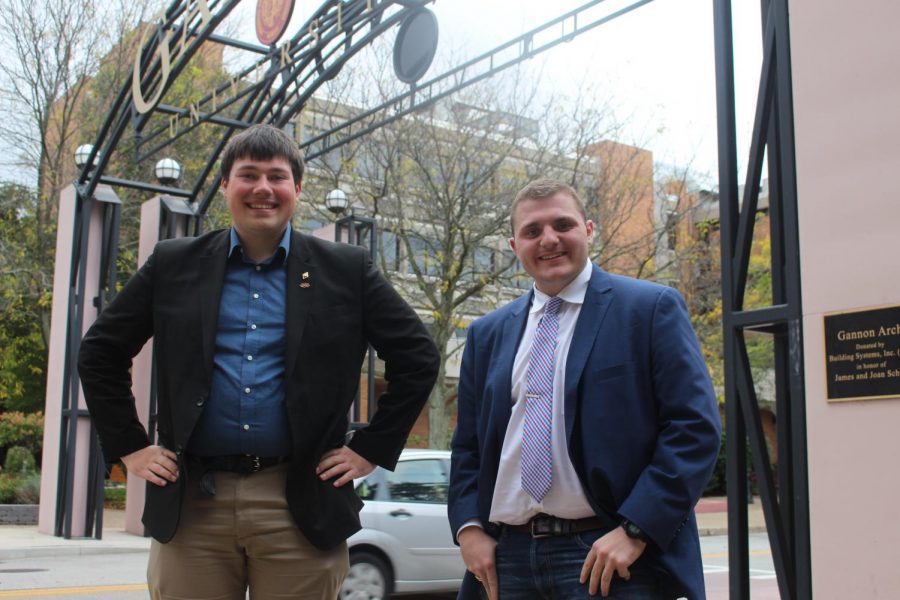Student government undergoes changes
New executive board and practices advance SGA transparency
October 26, 2021
The Student Government Association at Gannon University has undergone many changes in the last few months alone, even despite the COVID-19 pandemic and new leadership.
SGA is giving more money back to the student body and clubs and organizations than in years past through the implementation of Tier 0 and Club Support.
These systems were designed by Matt Schlessman, SGA president and a senior pre-dental and chemistry major, Derrick Gernatt, SGA chief of staff and a senior accounting major, and Dominique Booker, SGA vice president of finance and a senior accounting major.
The three executive board members came up with them in response to complaints that money was not being utilized properly in previous SGA administrations.
In Tier 0, any club or organization can obtain a maximum of $500, with proof of fundraising.
“Ultimately, it eliminates the service aspect of funding,” Gernatt said. “This allows for clubs and organizations with limited members to acquire funding.”
In Club Support, SGA gives money to clubs and organizations to participate in university activities.
Changes in regard to leadership also have occurred. SGA has a completely new executive board, general assembly and advisers. Along with this comes some reorganization of SGA leadership and hierarchy, Schlessman said.
“We are reconstructing how the student government is being operated, and the big goal that I would like to see come out of this is that SGA will operate differently to represent the student body the best we can,” Schlessman said.
Paul Perrine, one of SGA’s advisers and dean for Student Development and Engagement, said that this change brings about an opportunity to challenge how things have always been done.
“I think there is a strong foundation that I’d like to see built upon,” Perrine said. “This is an opportunity for SGA to examine its practices and systems to ensure there is representation from all students and that their current ways of operating are not excluding voices from parts of the student body.”
Having so many new members of SGA means that the student government is not tied to old tradition; however, this may also mean that members may not be sure of how things used to be
done or the most effective ways to execute a given plan. This has and will be a learning curve, Schlessman said.
Jaime McCaslin, SGA’s new adviser, said it has been difficult being new to both SGA and Gannon.
“Out of human nature, change can also be a challenge because it causes uncertainty and hesitation to others, so it’s important to realize that and that there is meaning and intentionality behind the change,” McCaslin said. “Every university’s SGA has a different structure, policies and culture, so it’s taking some time to learn how it works here.”
However, having new members in SGA can provide a fresh perspective, McCaslin said.
“There are more opportunities to look at things differently and ask questions about why we do it this way,” McCaslin said. “Change can provide opportunities for growth.”
Despite a rocky start due to transition between executive boards, the current SGA executive board has worked to increase transparency. One way this has been done is through the creation of a cabinet.
“Sometimes, members of the general assembly may feel under pressure or overwhelmed and may not say the ugly truth,” Schlessman said.
However, Schlessman said that in his experiences talking with students in the cabinet, they have given him the “ugly truth.”
This year’s executive board is also working tirelessly to rid SGA of the cliques that existed during previous executive boards.
“This time around, we’re making sure that if you’re not in a clique, it doesn’t matter,” Schlessman said. “You’re going to come in and have your opinion no matter what, and we’re going to hear it.”
Gernatt also said that breaking previously existing cliques of SGA is important to this year’s executive board.
“The previous SGA had a fairly toxic culture of cronyism; there were very clearly a lot of cliques who worked for their own interests,” Gernatt said. “Voices, popular or not, should be heard. No one is immune to criticism and if everyone likes you, you’re probably doing nothing.”
This idea was the motivation behind the formation of the cabinet. The cabinet is designed to get the perspective of those who may have been considered “outsiders” in previous SGA administrations.
“I had always considered myself an outsider from SGA, even though I’ve been in SGA my whole career at Gannon University,” Schlessman said. “I wanted that balance of power to make sure that just because something is unfavorable, doesn’t mean it should be swept under the rug.”
One of the reasons why the cabinet is so important to SGA is the fact that students come from a wide variety of backgrounds with a wide variety of student experiences.
“No matter what their opinion is — if it’s something that’s really good that SGA or the university is doing, or it’s something that really seems to be an issue on campus, we need to address it and make sure we are making Gannon the best version of itself,” Schlessman said.
Gernatt also said that this year, SGA is trying its best to be an open book.
“I’m always willing to explain to someone why we did what we did, what we did and didn’t do and how much it all costs — it’s the students’ right to know where and why their money is being spent,” Gernatt said. “I do my best to voice what I hear regardless of whether it hurts peoples’ feelings.”
Along with transparency, Schlessman and Gernatt ran on the principles of accountability and inclusiveness during elections.
The ways in which accountability has been executed have been mostly internal — for example, this year’s SGA retreat was kept well under budget in an effort to give more money back to the student body, while last year’s retreat was frivolously expensive, Schlessman said.
Schlessman and Gernatt aim to be inclusive by reaching out to all clubs and organizations to make sure they have a voice and are aware that they can serve in student government as a functional representative.
“Matt and I ran on voicing student concerns, and that’s something we’ve stuck to,” Gernatt said. “I want my constituents to know that I’m here for them — whatever they want, if they’re willing to bring their team to the table with a plan, we’ll polish it and aid in execution.”
Inclusiveness was also shown during Unity Week, where most key groups were targeted. An example of this was Culture Night, which Schlessman said was a smashing success.
This previous election was the second time Schlessman ran for SGA president. He did not get the role the first time. Schlessman decided to run a second time because he was unhappy with SGA’s response to various student issues.
“During COVID, I did not think the student government was doing its best to represent student voices,” Schlessman said. “As COVID went on, that was a huge indicator that we need to start relaying messages to the student body.”
Another reason why Schlessman wanted to run for SGA president was because of frustration for how late the previous executive board got up and running — not until mid-September to October.
“The student government’s challenges should not affect all clubs and organizations; that’s just downright wrong,” Schlessman said. “Just because a few people fail to get the student government up and running when it’s supposed to, that shouldn’t backtrack funding for all clubs and organizations.”
Schlessman also said he ran for SGA president a second time to make sure SGA is not doing a disservice to its constituents.
“I was motivated to run the second time around to make sure all student voices are heard and make sure our actions wouldn’t be affecting the student body negatively,” Schlessman said.
McCaslin said that SGA has an important role in bridging the gap between the student body and administration, which means that SGA holds a high level of responsibility.
“SGA has the unique opportunity to be connected with campus administration so they are in a valuable position to share student feedback and advocate for certain things students need,” McCaslin said. “It’s very important for the members of SGA to be a good representation of the student body and know what is going on so they can advocate accordingly.”
Perrine also said that SGA is an important chance for students to be a voice for students.
“It is an opportunity for students to exercise leadership and participate with the administration in governance,” Perrine said. “The SGA voice is sought after and listened to by the administration.”
SGA is also allocating funding to help renovate the Waldron Campus Center. Schlessman and Gernatt brought this idea to the cabinet, and they thought it was a great idea.
“We are making sure we are representing student opinions in getting that done,” Schlessman said.
Student opinion has also guided the formation of a new Gannon app. This project has been spearheaded by Alyssa MacLefko, vice president of technology and a sophomore cybersecurity major, who has helped develop the app in response to the student opinion that there are too many individual Gannon apps, Schlessman said.
“We are trying to get the Gannon app up and running and everything centralized, so students aren’t going to a thousand different places and students are well-informed,” Schlessman said.
While this executive board has already accomplished a number of things during its time in power, the transition from the old executive board to the new was challenging. Every position on the current executive board is filled by someone who has never served on the executive board before, or who has never been part of SGA in any capacity, aside from Schlessman. However, with all of these internal changes, SGA has still been able to create external change.
“I think it’s a miracle that we have been able to accomplish so many great things,” Schlessman said.
SGA has accomplished many things already, but there is still more on the horizon.
“I would love to see SGA members grow as leaders and use their considerable resources to change the lives of fellow students by advocating for positive changes and supporting the university’s mission,” Perrine said.
ANNA MALESIEWSKI






